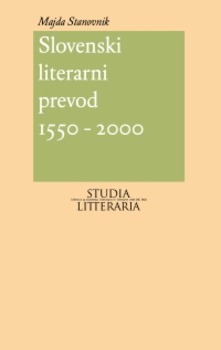Slovenski literarni prevod (1550–2000)
Knjiga obravnava prevod kot specifičen del slovenske književnosti od začetkov do sodobnosti, toda komplementaren njenemu avtohtonemu, izvirnemu delu. Podrobno prikaže značilne poglede na položaj prevoda, spremenljivo razumevanje njegove vloge in različno vrednotenje njegove funkcije pri vidnejših prevajalcih, kritikih, urednikih in literarnih zgodovinarjih.
Prenosi
Podatki o prenosih še niso na voljo.

2. december 2005
Zbirka
Avtorske pravice (c) 2005 authors and ZRC SAZU
Licenca

To delo je licencirano pod Creative Commons Priznanje avtorstva-Nekomercialno-Brez predelav 4.0 mednarodno licenco.
Podrobnosti o formatu publikacije na voljo: PDF
PDF
ISBN-13 (15)
978-961-254-513-0
Podrobnosti o formatu publikacije na voljo: Knjiga/Book
Knjiga/Book
ISBN-13 (15)
961-6568-11-6
Dimenzije
148 mm x 210 mm
Mehka vezava
